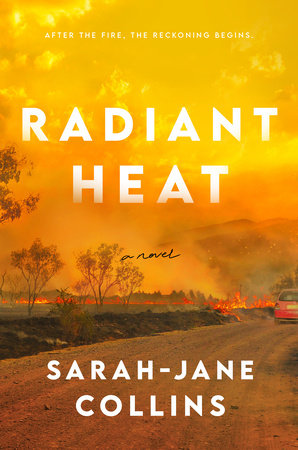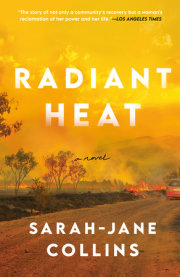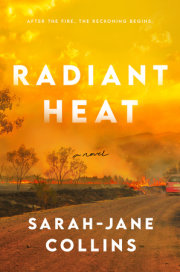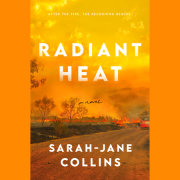1.
Alison was still alive. It felt like hours, but looking at her watch as she emerged from her blanket cocoon, she couldn't quite believe it had been only thirty minutes or so. She crawled, dripping sweat and soggy clothing, to the nearest window, stopping to drink a little from the bathtub and extinguish the few stray embers smoldering on the tile. She peered through the space where the windowpane had been. Outside, the stillness seemed to be a trick, concealing what had gone before. But the sky was red-orange, and there was smoke on the air, clinging to the trees, the eaves, the roof, the veranda, and the gutters. The ground was covered in ashen debris. Ghost-white chalky-black dusty mingled-gray soot covered everything.
The day was a little cooler now. No more than ninety-five as the sun crept low, a long way from its midday peak. Alison was alone, which didn't normally jar, but lying under the sill, staring up at the sky, the acrid smell of death and ash surrounding her, for once she allowed herself to be lonely. It was just a few seconds. And then she forgot to continue wallowing. The house was shrouded in smoke and had a few broken windows, but otherwise it was, somehow, all right. She moved slowly through the rooms, checking for damage. There was no power, no water in the taps, and where the fire had torn through the bush the trees were stripped and blackened. No viable limbs remained. Outside, she knew there would be work to do. Fences and trees down, the driveway surely blocked, impassable.
The screen door was hot to the touch, and an arm's length from the veranda the closest blackened trunk stood, barely upright. It would have to come down. Alison followed the sweep of the hill with her eyes. There was uncountable debris. Licking at the edge of the house, the front had suddenly moved around to the side and stormed off down the drive, lighting up one side of the unsealed road and leaving nothing but ash and black-brittle splinters in its wake. On the other side, the trees were the same mottled green-brown of hot high summer, as though nothing had happened.
She would have to wait for the State Emergency Service to come through and clear the drive before she'd be able to get the car out. That could take days, maybe longer, depending on the scale of the fire. The road was a kilometer away. She grabbed a bag and shoved a few things in it, checked her phone. No service. Time to go.
On the unsealed path Alison sifted her way through the wreckage back to bitumen. It was quiet now, the usual sounds of the bush dampened by death. What little wildlife had been able to flee would not return in a hurry. She thought of the family of tawny frogmouths that had lived in that now-blackened tree by the front door, their delicate feathers and round amber brown eyes, the curve of their sharp-edged beaks, and the sound of their calls, dragged up from their throats and percolated in the backs of their mouths.
As she walked, Alison tried to reorder her mind. You're fine. But it was hard not to get stuck dwelling on how likely it was that some of her neighbors were not. Alison hadn't seen it coming-how would anyone have seen it coming? She tried to arrange the past twenty-four hours in her head, tried to remember the normal course of her day, the things that happened before this happened. Pull apart the edges and put them back together so what had happened made some sort of sense, closed her eyes and in the sandy soot-covered space of the drive sunk down onto her knees and let the memories roll over her-the hours before everything changed, again.
By midmorning the heat was up there, pushing 104 degrees before the clock hit eleven, a hot wind racing up to a hundred kilometers an hour, air forced around the state like a giant dryer, not a drop of moisture about-humidity as low as two percent-and even in bayside Melbourne, where Alison had spent the night at a friend’s, it felt as though her eyeballs might cook in her skull.
She'd tossed her backpack into the boot of her car, slid into the driver's seat, and turned the key in the ignition, the radio stuttering to life . . . a high like that forecast, it's going to be a scorcher, and a total fire ban is in place, with the premier urging people in high-risk areas to stay close to their radios for updates . . . Alison knew the warnings about fires you can't escape, moments you can't change, houses you can't save, lives you can't get back; she'd heard it from her grandfather every summer since she was small.
The sound of a gum tree falling, one with a hundred years or more on its ledger, is the loudest, most sustained crack of thunder you'll ever hear, as limbs fold and crumple and crash and tumble all that long way down to the ground; timber splits and splinters with a wrenching that slices through time and tears at the tranquility of the day. You're in the eye of a storm when the thunder and lightning are simultaneous. Sound travels slower than light. When you can hear something loud enough to shake your eardrums and clatter about in the space between your ribs, it's right on top of you.
When Alison heard the first scream of the fire, she thought it was a gum blown down in the breeze. But at the window in her bedroom, she looked out across the bush and saw the smoke, heard more crashes-and then she saw it, coming fast, glimpses of red-hot movement among the trunks. Embers pushed the fire forward, rushing and crackling and spreading their blazing fury wide; there didn't seem to be time to even consider leaving-the car was on the other side of the house, but Alison had no way to know whether the fire was farther down the drive, making escape an impossibility. Instead, she had grabbed a blanket from the linen cupboard in the hall and rushed into the bathroom, dunking it in the bathtub.
Outside, the fire grabbed at trees and closed around them, two, three, four at a time, obliterating them with its gaping jaws, spitting still-smoldering remnants forward, leaving smoked skeletons in its wake; the bathroom was on the northeastern side of the house and Alison cowered there, her entire body swaddled in the thick, wet woolen blanket, the tile floor damp and cool as her cheek pressed hard against it. The noise was unbearable-a roaring, whooshing, crackling din; she closed her eyes and waited, uncertain what to do when you don't believe in prayer, and the sticky camphor smell of the blanket distracted her, made her hold the air in her lungs. With a start, she remembered to breathe, not sure how long it had been between gasps-it was so hot. She was sweating and the air felt empty, like the oxygen was all gone. A shower of glass rained down on the blanket, and Alison could feel the pressure in the room change; she lifted a corner of the blanket, saw a smoky, hazy, wide-open rectangle where the window had been, and flames just barely a meter away, spewing embers and thick smoke in her direction, and then, with one fickle twist, the firestorm receded-like a giant had drawn a deep breath in-the front changing tack as a southerly blew through.
Sitting now with the bitter char of burned eucalypt in the back of her nostrils, Alison felt as though she had been split in two. Slumped in the dirty ash, she traced the lines of her name with her fingers, rubbed them out, pushed the black dust back into place, and used her little finger to trace a quiet curve like the bend of the tawny frogmouth’s neck, where the fine, sharp feathers curved from the base of its head to the tops of its wings. The way the brown dirt mingled with the whitest parts of the ashy ends of sticks and leaves and whatever else evoked the mottle of their coats. The sun sunk lower still in the sky of wild red.
Get up. Keep moving.
She didn't listen to the unsettled voice inside her, just kept thinking about her morning, knees dug deep into the soot, rocks pressing into the soft hardness of her patellas. Still on her knees, she felt uneasy with the recollection, uneasy with the way it swished about in her brain. The pieces weren't quite whole, the moments not quite matching. Like the night the cops had knocked on her door and told her about the accident. Taken her parents away with a sentence. Stopped up the one remaining valve in her calcifying heart. She heard the whoosh of the cooling southerly breeze as it tickled the strands of hair at the nape of her neck, on her temples, and over her ears. From the silent bush she felt an intensity, as if it were staring at her. I'm losing it. She peered through the gaps in the thick low brush, tried to locate the feeling's source. A sharp jump in her bones as a twig snapped somewhere in that direction. The crisp, easy break of small wood under a big foot. There's someone there.
"Who's there?" Her voice carried into the trees, where it was absorbed and flattened. Deadened and muted by too much clutter. Nothing came back out.
Alison stood up and tried to shake the shuddering shiver from her frame. Could be anything. Could be nothing. Could be the snap and pop of wood returning to rest from heat-swelled discomfort. No one's going to be out here in the middle of this. Alison knew she shouldn't be either; it was time to get moving again.
There was a cocoon-like quality to this stretch, dense trees one way, the view of the house receding atop the hill, a hump in the road obscuring the lower part of the drive, and the black-white wall of stripped trees on the other side, making the familiar feel like the unknown. Goose bumps rose up on the flesh of her forearms as Alison fumbled over the hump and down toward the highway. An old-growth trunk had fallen as it burned, obstructing the path. Still smoking at the base, it was as wide as Alison was tall and stretched from the moonscape of the burned-out bush to the thick pale green bouquet on the other side. Alison raised her hands out in front of her, touched the unburned wood of the trunk near the top of what she could reach. The bark was slippery and sloughed off easily. Getting a foothold to clamber over the trunk would be dangerous. She cursed under her breath and looked around for another way through.
To the right, there was a narrow passage near the root base. Alison skirted the tree and emerged on the other side, soot smeared down her jeans. She blinked and saw something she couldn't process. Something that shouldn't be there.
She tried to blink it away. Tried to piece it together. Gather it up in a way that made sense. The hard outline of metal and glass, rubber and bright paint, against the soft chaos of the bush and the long dirt drive.
The car didn't seem real. Like the noise in the bush or the bird she'd sketched out in the ash, could it be a product of her uncooperative mind? No. It was covered in soot, but bright cherry red peeked through where Alison smeared her hand along the car. Felt the heat of the steel that had absorbed the fire. The windows were blown out and the bonnet was wedged, crumpled, under the heavy tree trunk. Apprehensive, she crept toward the door, not sure that she wanted to confirm what she saw the outline of inside, but unable to stop herself.
Fuck. There was a woman in the driver's seat, seemingly untouched by the chaos around her. Alison closed her eyes for a full minute before she willed herself to move around the car to the driver's side and lean in to check for any signs the woman might still be alive, but as she reached out to feel for a pulse, she knew there would not be one. The woman's eyes were open wide; the blue-gray of the pupils seemed washed-out, faded. Did they always look like that? When the last breath is drawn does the light really leave you?
She tried to remember her parents, at the funeral home. In the caskets. Their eyes were glassy like the marbles she had shot with her grandpa as a kid. These eyes weren't any kind of glass. Stone maybe. The kind you find in the sand, washed down smooth from the waves, dried out in the sun. The woman's skin was clammy but hot, and Alison shuddered at the sensation. Panic rose in her chest, making it hard to take deep breaths, or any breaths at all. The fog of it seeped into her brain and rang bells in her ears. She needed to know something, anything, that she could use as an anchor. Stop the whole world from spinning.
In the center console lay a purse and a mobile phone. She reached in and grabbed the purse. It was gray calfskin leather, worn smooth in patches where its owner's long fingers had gripped it tightly. There were lots of cards, the plastic corners peeling on some, others shiny and new. The woman was thirty-three. Alison's age. Her driver's license showed they were born weeks apart. They were the same height. They both needed to wear glasses when they drove. The card was old, Alison noticed as she scrutinized the Queensland crest superimposed over the details, the five years of validity almost up. The address was somewhere in the suburbs of Cairns, which surprised Alison, since she'd lived in Cairns too, a couple of years ago. She looked at the body again. Her face wasn't familiar, and neither was her name.
What was Simone Arnold doing there? In the middle of a bushfire, on the driveway to Alison's house? From the license a face full of life stared back at Alison. Here they were, her real eyes, dancing with light, and her cheeks, close to curving for a smile, light laugh lines visible at her temples. Simone Arnold looked like fun, Alison thought. Her dirty-blond hair sat in a long, neat braid that fell down the right side of her chest. She wore jeans and a pale pink camisole. Alison saw a blanket on the back seat, and she reached through the broken window for it. She threw it gently over Simone, not wanting to leave her exposed. She softly dragged her fingertips over her eyelids, concealing the dulled stare. She wasn't able to parse it. To hold this dead woman's story in her head. It was too much already.
Copyright © 2024 by Sarah-Jane Collins. All rights reserved. No part of this excerpt may be reproduced or reprinted without permission in writing from the publisher.







